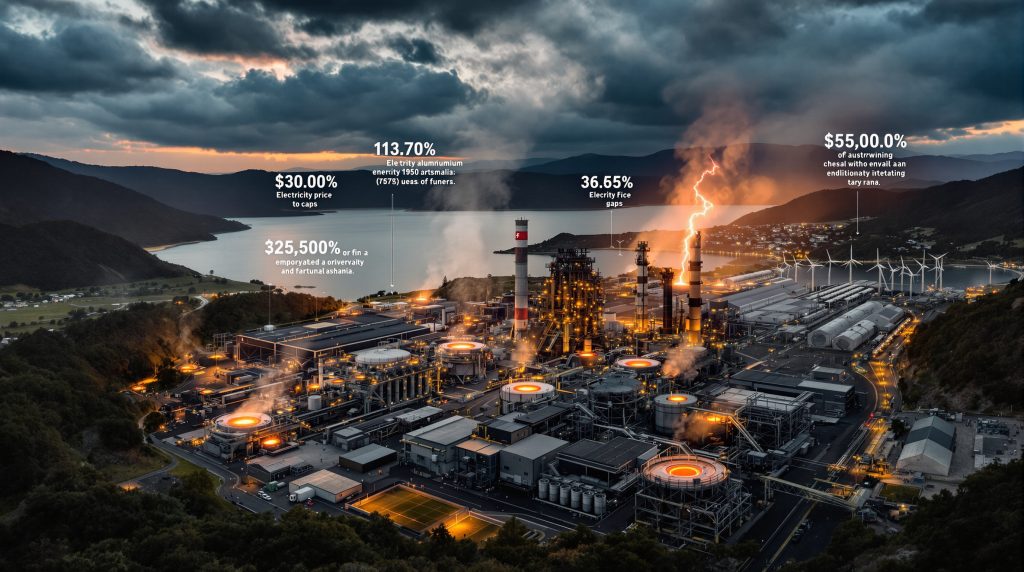Bell Bay Aluminium Power Supply Negotiations: Critical Crossroads for Tasmania's Industrial Future
The future of Bell Bay Aluminium (BBA) hangs in the balance as negotiations for a new power supply agreement with Hydro Tasmania reach a critical impasse. With the current 10-year power deal set to expire on December 31, 2025, the Rio Tinto-owned smelter has informed its workforce of a "significant risk" to operations. This northern Tasmanian facility, employing over 500 people directly, faces potential closure if a commercially viable power agreement cannot be secured in the coming weeks.
The situation represents more than just a corporate negotiation – it's a pivotal moment for Tasmania's industrial landscape, energy market, and regional economic impact. The plant's significance extends beyond its direct workforce to include approximately 1,000 indirect jobs and an estimated $240 million in supply chain investment throughout northern Tasmania.
Why Have Power Supply Negotiations Stalled?
The Price Gap Challenge
At the heart of the stalled negotiations is what Energy Minister Nick Duigan describes as a "gap" between what state-owned Hydro Tasmania can offer and what would make BBA commercially viable. Despite 18 months of intensive discussions, the parties have been unable to reach mutually acceptable terms.
Hydro Tasmania CEO Rachel Watson has indicated that while they've "worked hard to put our best possible offer forward," they "cannot offer uncommercial terms." This suggests the utility is operating near its cost of production for the energy required by the smelter.
The situation is further complicated by:
- BBA consuming approximately one-third of Tasmania's total energy generation
- The smelter's role in stabilizing the state's energy system
- The competitive global aluminum market pressuring margins
- Rising energy costs affecting heavy industries worldwide
Political Dimensions of the Negotiation Breakdown
The Bell Bay Aluminium power supply negotiations have become politically charged, with state and federal governments trading accusations over responsibility for the impasse:
- The Tasmanian government has called for federal intervention through the Green Aluminium Production Credit (GAPC) scheme
- Federal Industry Minister Tim Ayres has characterized the situation as a "failure of the Tasmanian government"
- Opposition energy spokesperson Janie Finlay claims the state government's "inaction is inexcusable"
This political dimension adds complexity to what is already a challenging commercial negotiation.
How Does This Compare to Other Industrial Energy Agreements?
Recent Support Packages for Australian Heavy Industry
The Bell Bay situation is not occurring in isolation. Several major Australian industrial operations have recently secured government support to maintain viability:
| Company/Facility | Support Package | Announced | Location |
|---|---|---|---|
| Glencore Copper Smelter | $600 million | October 2025 | Mount Isa, QLD |
| Nyrstar (metals smelter) | $135 million | August 2025 | TAS and SA operations |
| Liberty Bell Bay (manganese) | $20 million | May 2025 | Bell Bay, TAS |
These precedents have raised expectations that similar support might be forthcoming for BBA, particularly given its significance to Tasmania's economy and energy system.
What Makes Bell Bay Aluminium Strategically Important?
Economic Impact on Northern Tasmania
The potential closure of BBA would have far-reaching economic consequences:
- Over 500 direct jobs at risk
- Approximately 1,000 indirect jobs dependent on the operation
- $120 million in annual salaries flowing into the local economy
- $240 million in supply chain investment across northern Tasmania
Shane Power, chair of the Bell Bay Advanced Manufacturing Zone, has emphasized that losing such a large industrial business would be "absolutely devastating" not just for Bell Bay and its immediate surroundings but across northern Tasmania.
Energy System Stabilization Role
Beyond its economic footprint, BBA plays a crucial role in Tasmania's energy ecosystem:
- Consumes approximately one-third of Tasmania's energy generation
- Helps stabilize the state's energy system through predictable baseload consumption
- Offsets electricity prices for Tasmanian households and businesses through scale
- Represents one of the state's four major industrial energy consumers
Ray Mostogl, chief executive of the Tasmanian Minerals, Manufacturing and Energy Council, has warned that Tasmanians may be "oblivious of how this could impact their cost of living pressures" if the smelter were to close.
Why Is Bell Bay's Future Connected to Tasmania's Green Energy Transition?
Low-Carbon Aluminum Production Advantages
BBA has been highlighted as "among the greenest in the country" due to its use of Tasmania's renewable hydroelectric power. This positions the smelter advantageously in a global market increasingly focused on low-carbon aluminum production.
The smelter's connection to renewable energy transitions aligns with broader industry trends toward decarbonization and could represent a competitive advantage if properly leveraged. However, this advantage must be balanced against commercial realities and energy costs.
Federal Green Aluminum Production Credit Potential
The Tasmanian government has specifically called for federal support through the Green Aluminium Production Credit scheme, which is currently under development. This program could potentially bridge the gap between commercial viability and current energy pricing.
Federal authorities have indicated that consultation on the GAPC will open in coming weeks, though they've emphasized that "it really is up to the state government to put together a deal."
What Are the Broader Implications for Tasmania's Industrial Future?
Domino Effect Concerns
Industry observers and political figures have raised alarms about a potential "domino effect" if BBA were to close. With all four of Tasmania's major industrial sites experiencing business continuity issues in 2025, the loss of one could trigger cascading effects throughout the state's industrial ecosystem.
Opposition energy spokesperson Janie Finlay has characterized this risk as "catastrophic for the Tasmanian economy, for the energy system and for Tasmanian families and communities."
Pattern of Industrial Energy Challenges
BBA's situation follows a concerning pattern of energy-related challenges for Tasmania's major industrial operations in 2025:
- Liberty Bell Bay struggled to secure ore shipments in May
- Nyrstar required a $135 million support package in August
- Boyer Paper Mill (Australia's last) sought government support earlier in the year
This pattern suggests structural challenges in Tasmania's industrial energy landscape rather than isolated issues at individual facilities.
What Happens Next in the Negotiations?
Urgent Timeline Pressure
With the December 31 deadline rapidly approaching, BBA General Manager Richard Curtis has informed staff that negotiations are continuing "with utmost urgency." The company is simultaneously engaging with Hydro Tasmania and both state and federal governments to find a solution.
Potential Outcomes
Several potential scenarios could unfold:
-
New Commercial Agreement: BBA and Hydro Tasmania could reach a commercially viable power supply agreement without external intervention.
-
Government Support Package: State or federal authorities might provide financial support to bridge the gap between commercial realities and available energy pricing.
-
Conditional Extension: A temporary extension of the current agreement could be negotiated while longer-term solutions are developed.
-
Partial Curtailment: The smelter might reduce production capacity to align with affordable energy availability.
-
Closure Scenario: If no agreement can be reached, BBA could potentially enter "care and maintenance" mode or face permanent closure.
What Lessons Can Be Learned from Global Aluminum Industry Trends?
International Context
Tasmania's situation mirrors global challenges in the aluminum industry:
- Smelters worldwide are navigating the energy transition dynamics
- Energy costs remain a critical factor in aluminum production viability
- Government support for strategic industries has become increasingly common
- Low-carbon aluminum commands premium pricing in some markets
Industry Evolution Strategies
Successful aluminum operations globally have employed several industry evolution strategies that could inform Tasmania's approach:
- Developing demand-response capabilities to support grid stability
- Direct investment in dedicated renewable energy generation
- Long-term power purchase agreements with price stability mechanisms
- Government partnerships focused on decarbonization and regional employment
Conclusion: More Than Just a Power Deal
The Bell Bay Aluminium power supply negotiations represent a pivotal moment for Tasmania's industrial future. Beyond the immediate concerns about jobs and economic impact, the outcome will signal Tasmania's approach to balancing industrial heritage, energy transition, and energy export challenges.
As negotiations continue with "utmost urgency," the stakes extend far beyond the smelter itself to encompass Tasmania's broader industrial ecosystem, energy market structure, and regional economic resilience. The resolution of this situation will likely set precedents for how similar challenges are addressed throughout Australia's heavy industry sector in the coming years.
Disclaimer: This article contains analysis of an ongoing business negotiation that may impact Tasmania's industrial future. The situation is evolving, and outcomes may change as negotiations progress.
Are You Investing in Renewable Energy or Industrial Stocks?
Discover how major energy agreements and industrial developments impact ASX-listed companies with Discovery Alert's proprietary Discovery IQ model, which provides real-time insights on significant announcements across Tasmania's industrial landscape and beyond. Visit the Discovery Alert discoveries page to understand how critical turning points like the Bell Bay Aluminium negotiations can create exceptional investment opportunities.




